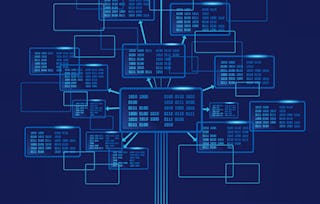Data analysis has replaced data acquisition as the bottleneck to evidence-based decision making --- we are drowning in it. Extracting knowledge from large, heterogeneous, and noisy datasets requires not only powerful computing resources, but the programming abstractions to use them effectively. The abstractions that emerged in the last decade blend ideas from parallel databases, distributed systems, and programming languages to create a new class of scalable data analytics platforms that form the foundation for data science at realistic scales.

Data Manipulation at Scale: Systems and Algorithms

Data Manipulation at Scale: Systems and Algorithms
This course is part of Data Science at Scale Specialization

Instructor: Bill Howe
62,653 already enrolled
Included with
772 reviews
Skills you'll gain
Details to know

Add to your LinkedIn profile
See how employees at top companies are mastering in-demand skills

Build your subject-matter expertise
- Learn new concepts from industry experts
- Gain a foundational understanding of a subject or tool
- Develop job-relevant skills with hands-on projects
- Earn a shareable career certificate

There are 5 modules in this course
Understand the terminology and recurring principles associated with data science, and understand the structure of data science projects and emerging methodologies to approach them. Why does this emerging field exist? How does it relate to other fields? How does this course distinguish itself? What do data science projects look like, and how should they be approached? What are some examples of data science projects?
What's included
22 videos4 readings1 programming assignment
Relational Databases are the workhouse of large-scale data management. Although originally motivated by problems in enterprise operations, they have proven remarkably capable for analytics as well. But most importantly, the principles underlying relational databases are universal in managing, manipulating, and analyzing data at scale. Even as the landscape of large-scale data systems has expanded dramatically in the last decade, relational models and languages have remained a unifying concept. For working with large-scale data, there is no more important programming model to learn.
What's included
24 videos1 programming assignment
The MapReduce programming model (as distinct from its implementations) was proposed as a simplifying abstraction for parallel manipulation of massive datasets, and remains an important concept to know when using and evaluating modern big data platforms.
What's included
26 videos1 programming assignment
NoSQL systems are purely about scale rather than analytics, and are arguably less relevant for the practicing data scientist. However, they occupy an important place in many practical big data platform architectures, and data scientists need to understand their limitations and strengths to use them effectively.
What's included
36 videos
Graph-structured data are increasingly common in data science contexts due to their ubiquity in modeling the communication between entities: people (social networks), computers (Internet communication), cities and countries (transportation networks), or corporations (financial transactions). Learn the common algorithms for extracting information from graph data and how to scale them up.
What's included
21 videos
Earn a career certificate
Add this credential to your LinkedIn profile, resume, or CV. Share it on social media and in your performance review.
Instructor

Offered by
Explore more from Data Analysis

University of Washington

University of Washington

University of Washington
Why people choose Coursera for their career

Felipe M.

Jennifer J.

Larry W.

Chaitanya A.
Learner reviews
- 5 stars
56.92%
- 4 stars
25.22%
- 3 stars
8.92%
- 2 stars
4.78%
- 1 star
4.13%
Showing 3 of 772
Reviewed on Jan 10, 2016
Great course that strikes a balance between teaching general principles and concepts, and providing hands-on technical skills and practice.The lessons are well designed and clearly conveyed.
Reviewed on Dec 2, 2015
Very good course, but lectures could be more tuned onto the home assignments. A lot of independent work for me at least. Teacher is very good.
Reviewed on Jan 1, 2016
Last week of the course is too much information and without any assignments it kind of doesn't make much sense and it doesn't stick.

Open new doors with Coursera Plus
Unlimited access to 10,000+ world-class courses, hands-on projects, and job-ready certificate programs - all included in your subscription
Advance your career with an online degree
Earn a degree from world-class universities - 100% online
Join over 3,400 global companies that choose Coursera for Business
Upskill your employees to excel in the digital economy
Frequently asked questions
To access the course materials, assignments and to earn a Certificate, you will need to purchase the Certificate experience when you enroll in a course. You can try a Free Trial instead, or apply for Financial Aid. The course may offer 'Full Course, No Certificate' instead. This option lets you see all course materials, submit required assessments, and get a final grade. This also means that you will not be able to purchase a Certificate experience.
When you enroll in the course, you get access to all of the courses in the Specialization, and you earn a certificate when you complete the work. Your electronic Certificate will be added to your Accomplishments page - from there, you can print your Certificate or add it to your LinkedIn profile.
Yes. In select learning programs, you can apply for financial aid or a scholarship if you can’t afford the enrollment fee. If fin aid or scholarship is available for your learning program selection, you’ll find a link to apply on the description page.
More questions
Financial aid available,

